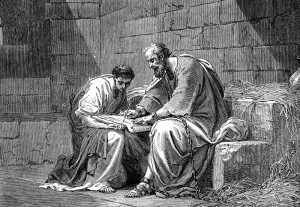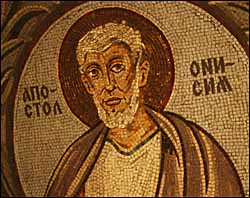“For this reason, though I am bold enough in Christ to command you to do your duty, yet I would rather appeal to you on the basis of love – and I, Paul, do this as an old man, and now also as a prisoner of Christ Jesus.” [Philemon 8-9, NRSV]
[L] Paul writing from prison. [M] Paul in prison. [R] Onesimus (mosaic).
Saint Paul is not usually someone from whom you want to receive a letter. He either scolds you thoroughly or he asks you to do things which you would rather not do and yet you are unable to say no to. Philemon received such a letter from Paul who wrote to ask him to graciously accept back a runaway slave called Onesimus and to then release him to Paul as a freeman.
Paul, writing from a prison in Rome, had spent much of his ministry in the Roman province of Asia – now known as Turkey, whose territory includes Tarsus, Paul’s birth place, and Antioch, where Paul began his mission to the Gentiles together with Barnabas. He made a number of converts in Colossae, a city about 80 miles east of Ephesus. Among these was the family of Philemon, a well to do slave owner who with his wife Apphia hosted the church in their home.
One of Philemon’s slaves, Onesimus, has fled his master. A runaway slave, Onesimus was in the worst possible position, and Paul’s letter indicated that he might even have stolen from his master. He would have absolutely no rights under Roman law and could be killed with impunity. Forced into the streets and hiding, runaway slaves struggled for mere survival. Those who were caught were imprisoned without hope of ever seeing the outside world again.
As Providence would have it, Onesimus met Paul, under whose ministry Onesimus became a Christian. Paul insisted that Onesimus’ new relationship with Christ required of him to make right his relationship with Philemon. So Paul sent him back to Philemon with a note on behalf of Onesimus. Given the culture and background to this story, Paul’s request of Philemon was nothing short of astonishing. For us, this short note from Paul carries several important spiritual lessons. It is certainly a pretty fertile ground for seeing how great meaning is found in small places. We see all this in the way Paul articulates his appeals to Philemon, addressing six objects.
- 1. He appeals to a spirit of gratitude. In all that he is saying in the note, Paul is pointing to how God’s generosity in Christ shapes the Christian life. God’s gracious love, Paul is saying, fosters a spirit of gratitude and an ethic of gratitude. So he begins in his opening address by saying, “I pray that the sharing of your faith may promote the knowledge of all the good that is ours in Christ. For I have derived much joy and comfort from your love, my brother, because the hearts of the saints have been refreshed through you.” Here, Paul the rhetorician repeatedly plays with the word “heart” (splagchna, meaning the inward parts so pointing to the heart, in verses 7, 12, and 20): he is thankful for Philemon refreshing the hearts of the saints (v.7) and is expectant that Philemon will refresh Paul’s heart by freeing his runaway slave Onesimus (v.20), who has not only become Paul’s son by saving faith while in prison in Rome but has also become Paul’s heart (v.12). As the biblical scholar Robert Jewitt puts it pointedly, “Philemon… has Paul’s heart in his hands.” John M. Perkins has also made a useful observation: “This same Onesimus who had been useless, once saved, becomes useful; no doubt, like Paul the ‘Apostle of the heart set free,’ he too is freed from the heart and now serves willingly, freely out of a spirit of gratitude. Just as Onesimus serves Paul freely, Paul asks Philemon to give Onesimus his freedom.”
- 2. He appeals to the spirit of koinonia. Having embraced the same faith in Christ, Onesimus now belongs to the same household of God as do Philemon and his beloved and now aged Apostle Paul writing from a Roman prison. “I appeal to you for my child, Onesimus, whose father I have become in my imprisonment.” What Paul has chosen to do is to appeal to Philemon in love as a result of God’s grace at work in Paul’s, Philemon’s and Onesimus’s lives in relation to one another and the whole church. This is an appeal to Christian fellowship – this koinonia or communion with fellow Christians in the company of God. The give and take of mutual benefit that is communion (koinonia) stems from gratitude we spoke about earlier and it flows from God’s loving grace at work in people’s lives in relation to one another.
- 3. He appeals to new relationships grounded in Christ. By running away, Onesimus met Paul and was converted. Having accepted Christ, Onesimus is now a fellow brother in the Lord. Appealing also to Divine Providence, Paul thus points to a fundamental change in identity that comes when one becomes a Christian. Onesimus is now a child to Paul and a brother to Philemon because of what Christ has done for them all. “Perhaps this is why he was parted from you for a while, that you might have him back for ever, no longer as a slave but more than a slave, as a beloved brother, especially to me but how much more to you, both in the flesh and in the Lord.” In Christ we are bound together in new familial relationships that will endure beyond the limits of mortal life. Will outsiders see and recognize us as Christians “by our love”? Whether or not we are conscious of it, the Christian community is being constantly watched, tested and judged on the reality of the new relationships which are supposedly formed because of Christian faith. Real faith results in real change in relationships. We are family; we are kin! Is it true in our faith community? Is the grace of God evident in the church-community where we worship?
- 4. He appeals to the deserved-freedom of Onesimus. In Christ the walls between slave and free are done away with, as Paul wrote in another epistle: “There is no longer Jew or Greek, there is no longer slave or free, there is no longer male and female; for all of you are one in Christ Jesus” [Galatians 3:28]. Without directly attacking the institution of slavery common in his time, Paul is deeply concerned to show that in the Christian community, all barriers and distinctions have been pulled down in favor of our oneness in Christ. Paul has understood his Lord well who during his earthly life had dismissed the issue of status. Teaching his followers to defy the status-ridden convention of the world, Jesus insisted that status must have no place in the Christian community where the one who is greatest becomes a servant. Jesus said to his disciples, “Whoever wants to be first must be last of all and servant of all” [Mark 9:35]. Today, Pope Francis as the leader of the Roman Catholic Church is painstakingly teaching the clergy to live this one, clear, and simple teaching from the Lord. The Holy Father is calling the ordained ministers of the Word to be obedient servants of the Word, and not be its rebels!
- 5. He appeals to freedom rooted in forgiveness in Christ. Paul expresses the heart of Christian faith when he says to Philemon regarding Onesimus, “If he has wronged you in any way, or owes you anything, charge that to my account… I will repay it.” This is a powerful allusion to the cross of Christ who, in his magnanimous love had made the ultimate sacrifice on the cross in order that all iniquities might be charged to his account! So Paul appealed to Philemon to let divine grace flow freely in him so as to allow the sin-defeating and death-defying power of divine love move him to forgive Onesimus out of the depth of his renewed and believing heart. What we have here is both a lesson on the Christian doctrine of forgiveness in action. As Christians, we are to forgive those who have injured us, to be prepared to be reconciled with our enemies,on account of Christ.
- 6. He appeals to love and free will, not to command. Paul’s credit balance, as it were, with Philemon, as they both knew, was considerable. From what we have read about Paul’s life and work, we have no reason to suppose that he is exaggerating. Philemon’s debt (and all Christians, for that matter) to Paul is incalculable. However, resisting the urge to demand Philemon’s obedience, Paul prefers to see him voluntarily releasing Onesimus to him as a personal aide. So Paul makes his request by a soft touch, instead of a crude demand; he requests; he does not compel. “Accordingly, though I am bold enough in Christ to command you to do what is required, yet for love’s sake I prefer to appeal to you – I Paul, an ambassador and now a prisoner also for Christ Jesus… I would have been glad to keep him with me, in order that he might serve me on your behalf during my imprisonment for the gospel; but I would prefer to do nothing without your consent in order that your goodness might not be by compulsion but of your own free will.” Writing in a relational context, Paul’s appeal to the heart, is coupled with the reminder that they are all in one another’s debt in the Lord who is at work in and through them. This, too, is a deep lesson on Christ’s saving grace which drives mutuality and reciprocity – a Christian reality on which contemporary faith community can learn much from St Paul.
The Bible does not tell us whether Philemon released Onesimus to Paul and, if he did, whether Onesimus, now a free man, actually returned as a free man to follow Paul. There is a paucity of historical records concerning him. In the Eastern Church tradition, his death is placed at around 68 AD. Known also by the names of Onesimus of Byzantium and The Holy Apostle Onesimus in some Eastern Orthodox churches, it is believed that he is the same Onesimus whom the second century St Ignatius of Antioch has referred to as Bishop in Ephesus.
The letter to Philemon is one of those wonderful examples of how, in grace, great meaning is found in small places. This little New Testament book has surprisingly quite a few important spiritual lessons for those who have hearts to listen.
.Copyright © Dr. Jeffrey & Angie Goh, August 2016. All rights reserved.
You are most welcome to respond to this post. Email your comments to jeffangiegoh@gmail.com. You can also be dialogue partners in this Ephphatha Coffee-Corner Ministry by sending us questions for discussion.



